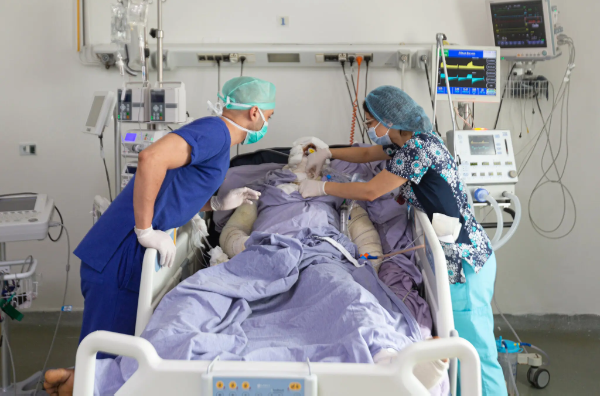-
Posts
3,840 -
Joined
-
Last visited
-
Days Won
119
richardmurray's Achievements
Single Status Update
See all updates by richardmurray
-

Attending to a patient at the severe burns unit.Credit...Zied Ben Romdhane for The New York Times
In a Hospital Ward, the Wounds of a Failed Democracy Don’t Heal
Tunisia’s road to democracy began with a self-immolation, and such cases have filled hospital burn wards ever since, as elected leaders failed to deliver on a promise of prosperity.
By Vivian Yee
Vivian Yee, who covers North Africa for The Times, spent a week at the Trauma and Severe Burns Hospital in Ben Arous, near the Tunisian capital, where she watched doctors carry out their work.Jan. 3, 2023
The most troublesome patient in the hospital’s severe burns unit was refusing to let the orderlies change the bandages that had encased him since he set himself on fire three months earlier, so Dr. Imen Jami burst into his room, her habitually knit brows drawn as tight as they would go, her lips pressed together in a magenta line.“Look, I have someone in a coma, and I have no time,” she told the young man. “The final word is that you’ll get on the bed and change your bandages.”
“I’m so tired,” he moaned.
“You’re really not going to have them changed?” she said, looming over him.
“No, I will,” he said, quailing.
The doctor had seen this before: Tunisians who set themselves on fire in the throes of desperation often had little interest in recovering. Unable to support their families in a country that was coming apart, they had only the same old futility waiting for them back home.
In a sense, Tunisia’s 2010 revolution — and the wave of Arab Spring uprisings it inspired — began in this hospital burn ward near the capital, Tunis, and sometimes it seems as if its dying breaths are being taken there, too.
A decade ago, the Trauma and Severe Burns Hospital treated Mohamed Bouazizi, the 26-year-old fruit seller whose self-immolation came to stand for the rage that brought down a dictator and launched a democracy. Now it houses self-immolation patients whose own acts of protest changed nothing, and a host of doctors trying to escape. The country’s collective despair was so great that Tunisians turned once again to the one-man rule they had fought so fiercely to overthrow just a decade ago.
All the while, Dr. Jami had been there on the fourth floor.
She was there in the waning days of 2010, when Mr. Bouazizi was brought into the ward in critical condition, and there when the former dictator, President Zine el-Abidine Ben Ali, came to pose for a picture at his bedside in an unconvincing attempt to show the public that he cared. Less than three weeks later, on Jan. 4, 2011, Mr. Bouazizi was dead.
She was there in the days that followed, when a surge of young men from around the country inundated the hospital after their own copycat self-immolations.
Outside the walls of the hospital in the Tunis suburb of Ben Arous, Mr. Bouazizi’s death was galvanizing Tunisia’s Jasmine Revolution. “Jobs, freedom, dignity,” protesters chanted, and soon the revolt spread from young, struggling men like Mr. Bouazizi to all kinds of Tunisians. By Jan. 14, 2011, Mr. Ben Ali had fled the country, and Tunisia’s uprising had set off others across the region.
The others ended in bloodshed. But for a while, it seemed, democracy was blooming in Tunisia — the Arab Spring’s last great hope. Yet even as Tunisians’ freedoms multiplied, bread got harder to afford, and democracy itself started to seem undignified.
The old regime’s crimes went largely unpunished. Parliament deadlocked. Corruption spread. Unemployment rose. Poverty deepened. Buffeted by inexperience, infighting and bad luck, 10 prime ministers in 10 years failed to make urgent economic changes.
The post-revolution government was dominated by an Islamist party, Ennahda, and religious-secular divisions polarized a society unsure about whether politicians who wanted to govern according to Islamic principles belonged in a democracy at all.
During what Tunisians called the “black decade” after the revolution, the Bouazizi copycats arrived at the hospital by the hundreds. A relative rarity before the revolution, the act of self-immolation soon accounted for a fifth of the burn ward’s cases.
Then, in 2019, Kais Saied — an austere constitutional law professor — was elected president. Harnessing Tunisians’ rage and regret over the revolution, he suspended Parliament in July 2021, sidelined political parties, undercut civil liberties and embraced one-man rule, all but burying the country’s brief experiment with democracy.
And many Tunisians cheered.
People like Dr. Jami and many of her colleagues wanted rescuing, and after a decade of watching elected leaders fumble, they had not seen a better candidate for savior than Mr. Saied.
More than a year after his election, however, the president had been unable to do much about the foundering economy, the soaring prices or the lack of decent jobs. Which was why an estimated 15,400 Tunisians boarded rickety boats bound for Europe last year, only for at least 570 of them to drown, and part of why young men kept setting themselves on fire.
In Tunisia, illegal migration to Europe by boat was called the “harga.” The word translated, literally, to “burning.”
On the burn ward, all the doctors raised their voices so patients could hear them through the thick layers of white bandages that shrouded their heads, but Dr. Jami was loudest of all. Her “good mornings” were trumpet blasts, her entrances laughter and thunder; she could get a roomful of staff laughing with a single line, or upend it with demands for help, now.
The daughter of a nurse, Dr. Jami had studied medicine because it was her father’s dream for her, joining the burn unit soon after it opened in 2008.
She and her office mate, a fellow general practitioner, Behija Gasri, had spent five days straight in the ward during the revolution, changing diapers and mopping hallways themselves because no one else could reach the hospital. So many self-immolation cases were brought in that they ran out of beds and started putting patients on chairs.
Chaos and upheaval: That was all the revolution had brought her, she often thought.
In the decade that followed, most of Tunisia’s self-immolation cases were brought to this hospital, North Africa’s premier burn treatment center, their numbers growing just as the medical staff caring for them shrank. The increasingly bleak economy had pushed thousands of Tunisian doctors to leave the country for better opportunities abroad, including half the burn unit’s senior specialists, and now there was far more work and far less money for the ones who had stayed behind.
But Dr. Jami and Dr. Gasri were still here, even if survival and resilience in the face of adversity, it often seemed, had earned them little more than the chance to survive yet more adversity.
Doing the rounds of their patients every morning in early October, the gaggle of doctors in scrubs and rubber clogs — many of them women, most of them bespectacled, and all of them tired — tended to pass the self-immolation patient’s room without comment.
Day after day, he lay in the dark as the small TV on the wall cast ghostly light on his face, curling and uncurling the unbandaged fingers on his right hand.
Changing his bandages was always an ordeal. When orderlies wheeled him back to his room after Dr. Jami’s scolding, he was groaning in pain.
“Slowly, slowly!” he shouted as they shifted him back onto the bed. This time, Dr. Jami’s office mate, Dr. Gasri, was there to greet him. She spoke softly.
“Help us help you get better soon,” she said.
He said nothing, except to ask a nurse for a new diaper.
Dr. Gasri had the graven, planed face of a Byzantine mosaic saint, the impression of piety reinforced by a daily uniform of white head scarf and white coat. More than a head shorter than Dr. Jami, she moved quietly down hallways where her office mate whirled and strode.
During morning rounds, Dr. Jami massaged Dr. Gasri’s shoulders, patted upper arms in apology as she squeezed past the nurses, whispered jokes in people’s ears. She blew brusque little kisses in greeting, thanks and farewell. Dr. Gasri just smiled.
When Dr. Gasri first joined the unit in its early years, she had barely been able to take it. She fainted the first time she saw and smelled the burned flesh under the bandages.
Still, it was rewarding work. Former patients often came back to thank her and pray for her, she said. Sometimes they brought gifts from their home regions: dates sweet as caramel from the city of Tozeur, or, once, a bottle of fresh milk a farmer had gotten up early to deliver all the way from impoverished Kasserine. By the time it reached Ben Arous, it had gone bad.
Now a former patient was waiting for her in the hall, there with not a gift but a plea.
Ahmed Yaakoubi had first been admitted in 2012 after burning his lower legs in a car accident. Recovery was supposed to take two years, but for nearly a decade now, he had been unable to come up with the money for regular bandage replacements and follow-up treatment. At 25, unable to fully control his lower legs, walking with a limp, he couldn’t find work.
Dr. Gasri smiled at him as they shook hands, but what she had to say was serious.
“I don’t want to lie to you,” she said. “Your legs are worn out. You can’t go on like this.”
He hadn’t changed the bandages that still swaddled both legs from the knee down for four days now, risking infection and maybe even amputation. The charity his neighbors pressed on him after the accident had tapered off four years later, when he started to walk again, though he said one neighbor who was a nurse kept selling him discounted bandages.
But years had turned to a decade, Tunisians’ budgets had gone from modest to minuscule, and now nobody was giving. He felt he was a burden on the neighbor, who could no longer conceal his impatience.
Ten dinars — about $3 — for each hospital visit, 20 for fresh bandages. At the pharmacy, some products he was supposed to use had tripled in price. And he was meant to change the wrappings every day.
“I can’t even afford to eat,” Mr. Yaakoubi told Dr. Gasri. “How can I buy new bandages?”
She told him to come back on Monday. Maybe she would have something for him then. She would ask a few relatives to chip in, and, probably, dip into her own pocket.
The burn unit’s founder and head, Amen Allah Messadi, had set up an association to raise money for patients who couldn’t afford physical therapy, pressure garments, laser therapy, prosthetics and bandages, which was to say most patients. The erratic public health care system instituted after the revolution covered only the formally employed, and by the World Bank’s estimate, nearly half of Tunisians eked out a living off the books.
But the association had paused its fund-raising when Covid-19 hit, and donations dried up as times got harder. These days, it was often the staff who gave, stuffing spare dinars into an envelope that Dr. Gasri kept to help those in need.
Money had never seemed so tight when Ben Ali, the former dictator, was in power. As the regime’s heavily state-controlled approach opened up to private investment, the country’s middle class was considered sound, its education and health care systems solid, its markets’ prices steady.
Yet citified coastal Tunisia was much wealthier than the country’s rural inland, the gap between the Ben Ali cronies who controlled much of the economy and the rest stoked resentment, and the young people who made up nearly a third of Tunisia’s 11 million people, like Mr. Bouazizi, were desperate for decent jobs. He had set himself on fire to protest police harassment after municipal officials confiscated the fruit he was selling and, according to his family, slapped him.
A decade of democracy brought elections, freedom of expression, a thriving press, a muscular civil society and independent institutions, all things the country had never had under French colonial rule or the two dictators who followed. But such intangibles meant little to the revolutionaries who had demanded better lives — materially, and fast.
The foreign debt and economic structure that the new Tunisia inherited from the old Tunisia — the country imported expensive things and exported cheap ones — would have made that a challenge even for experienced leadership, and Tunisia’s new leaders were green, more focused on a new constitution than fixing the economy.
Early governments ineptly tried to hire and borrow their way into prosperity; later governments all failed to overhaul the economy.
But they might have avoided disaster if Western countries had stepped up with far more aid and debt relief, and if not for a run of bad luck: a financial crisis in Europe, a war in neighboring Libya and terrorist attacks by Islamic extremists that crippled the country’s vital tourism industry.
The attacks deepened suspicion of Ennahda, vitriol that eventually tarnished the whole Parliament that the Islamist party had dominated.
The decline of faith in democracy could be measured in voter turnout. Back in 2011, during the first parliamentary elections after the revolution, 92 percent of voters went to the polls. By 2019, when Mr. Saied was elected as an incorruptible-seeming outsider, just 41 percent bothered.
Or it could be measured in self-immolations. With every fresh economic downturn, more people set themselves on fire, and eight years into Tunisia’s democratic experiment, the doctors whom Dr. Messadi had worked hard to recruit started leaving the burn unit, one by one. That left only Dr. Messadi, Dr. Jami, Dr. Gasri and two senior specialists — one of them debating whether to move abroad.
In France, where Tunisian doctors often emigrated, the pay wasn’t much better, at least not at first. But the equipment, facilities, regulations, malpractice insurance and hours were, and many of the unit’s young doctors said they believed there would be less burnout and depression.
In France, there wouldn’t be a political crisis with no sure outcome, or an economy that seemed headed for collapse.
In July, Mr. Saied rammed through a new Constitution in a referendum, demoting Parliament to more of an advisory body and giving himself the kind of presidential powers no leader had enjoyed since Mr. Ben Ali. Western experts warned that the new charter would hasten the end of Tunisia’s democracy.
Then he urged people to vote for a new, revamped Parliament, one that did away with the influence of Ennahda and other political parties. But only about 11 percent of eligible voters showed up for the Dec. 17 elections.
For Dr. Gasri, the surge of hope she had felt during the revolution was still down there somewhere, though it felt harder to remember these days. She said she would understand if her son, who was studying for an architecture degree, left for a few years’ professional experience in Europe, but she wanted him to come back someday.
She would stay.
“If we all leave,” she said, “what will happen to Tunisia?”
To Dr. Jami, it felt like the revolution had been the beginning of a long plunge into darkness. She said she spent most days now in a funk of stomach pain, fatigue and stress.
“Get me a man,” she said, hunting not for a ring but a visa to a Western country. “Get me out of this country.” It was a joke, but if she didn’t have to support her elderly mother, she said, she would be trying to leave.
The latest blow to the doctors had come when Covid-19 hit the hospitals hard, forcing intensive care specialists to the front lines, even as the strapped Health Ministry had to cut residents’ pay.
It was amid the death and chaos that Mr. Saied mounted his power grab. Dr. Jami said she had been cautiously relieved at his intervention. Dr. Gasri was just hoping for the best.
Now it had been more than a year. The staff tried not to dwell on the fact that, with the economy the way it was, with Mr. Saied apparently unable to fix things, many more young men who had tried to self-immolate might come their way.
“It’s one of the best countries, but I want to leave because they destroyed it,” Dr. Jami said to one of the physical therapists during a rare break one afternoon. Her face was soft with tiredness. “They didn’t leave us with any reasons to stay.”
She meant the politicians they had voted for, dutifully, election after election. Soon after, she told Dr. Messadi she wanted to leave early, and went home.
Ahmed Ellali contributed reporting.
MY THOUGHTS
Financial poverty is a powerful thing and many governments or communities in humanity, through a recent heritage of white european domination don't have the culture to handle how to be poor. It is easier to flee to another country, to burn yourself alive, than to be fiscal poor.
Secondly, though more potently, democracy, the rule of the people always exist. The form of government doesn't matter, the people always rule, the question is, how do the people want to be ruled. Sometimes most folk accept someone with a crown. sometimes most folk accept people voted in. Sometimes most folk accept individuals in a minority populace among them deciding among themselves. but the people always rule and yes, even when a commonly called dictator is the head.
Lastly, or rarely stated, the fiscal wealth of the governments deemed wealthiest in humanity, all comes from slavery/genocides/wars/various levels of abuse. Countries like tunisia, who are larger than city states, who are trying to make financial changes absent the ability to commit genocides/enslavements/wars/abuses to others especially, are always going to have a hard time. Yes, Germany or Japan or China didn't need so much of that abusive power to others but all of them were given money by the usa to prevent them from joining an enemy in the commonly called cold war. To many countries are deemed financially successful absent the truth to their fiscal profit admitted in media alongside.In Amendment
The quote by the tunisian woman about getting a man for immigration is a great public admission, when it comes to the nature of male or female relationships concerning the immigrant community and those in the countries of wealth.
Article URL
https://www.nytimes.com/2023/01/03/world/middleeast/tunisia-democracy.html








.thumb.jpg.ed52910791d00308abb8c218695bec88.jpg)


